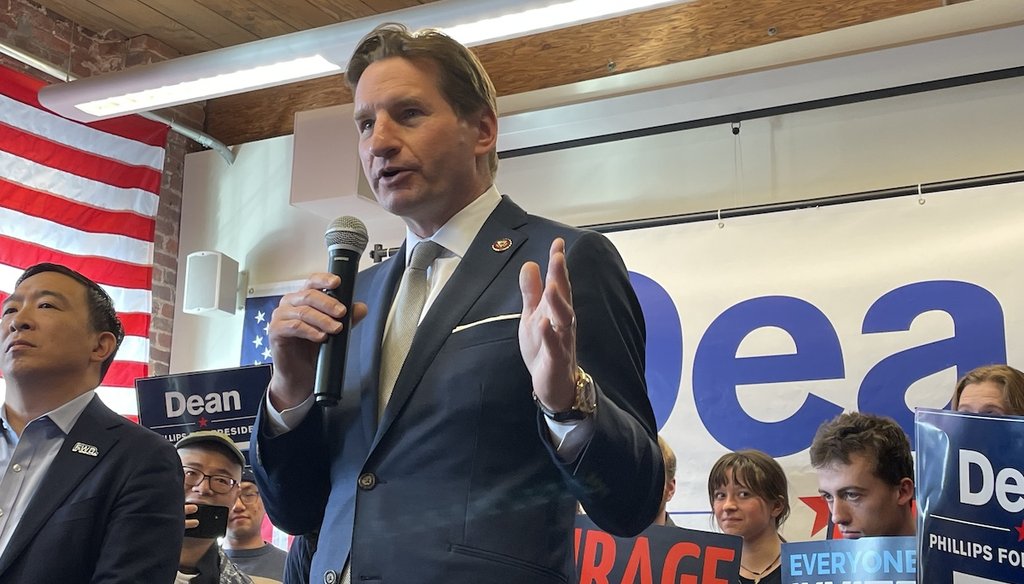Stand up for the facts!
Our only agenda is to publish the truth so you can be an informed participant in democracy.
We need your help.
I would like to contribute

Democratic presidential candidate Dean Phillips addresses voters at an event in Manchester, N.H., with former Democratic presidential candidate Andrew Yang (left) on Jan. 18, 2024. (Louis Jacobson/PolitiFact)
MANCHESTER, N.H. — Rep. Dean Phillips, D-Minn., has been campaigning aggressively in New Hampshire, hoping to convince Democratic voters that a new face is needed to keep the party in control of the White House in 2024.
In a series of events in the state on Jan. 18, Phillips, who is challenging incumbent Joe Biden for the Democratic presidential nomination, traveled with entrepreneur and 2020 Democratic presidential candidate-turned-independent Andrew Yang. The two discussed the promise, and potential pitfalls, of artificial intelligence.
In a packed room at the University of New Hampshire, Manchester, Phillips said AI "can be beautiful, but it also has great risks. It's going to disenfranchise this economy. It's going to be disruptive in ways that we can actually anticipate."
Philips compared relative inaction on AI policy now with inaction on climate change a century ago. "We had 100 years to prepare for climate change," Phillips said. "We knew 100 years ago what would happen by burning fossil fuels."
PolitiFact checked with several academics who have studied the history of climate change science and found that the reality was not so clear cut.
"In principle, the effects of burning fossil fuels were known" by a century ago, "but this was not widely known or recognized," said Ben Lieberman, a historian at Fitchburg State University and co-author of "Climate Change in Human History: Prehistory to the Present." Only later in the 20th century did this knowledge begin to amass, Lieberman said.
The first inklings in the scientific community emerged in the 1850s, said John Brooke, an emeritus professor of history at Ohio State University and author of "Climate Change and the Course of Global History: A Rough Journey." Then, in 1896, the Swedish scientist Svante Arrhenius wrote a paper explaining how industrial carbon dioxide emissions could spur a warming trend that would become known as the greenhouse effect.
So, in theory, the world has had more than a century to prepare for significant climate change, said Joshua P. Howe, an associate professor of history and environmental studies at Reed College and author of "Behind the Curve: Science and the Politics of Global Warming."
"There was a lot that was still unknown, but if the sentiment was that we have known about this at least in broad terms for a long time, that's right," Howe said.
However, other historians cautioned that it took more time for this knowledge to coalesce and gain wide acceptance.
"Understanding the earth's heat budget and infrared radiation was in its infancy," said James R. Fleming, an emeritus professor of science, technology and society at Colby College and author of "Fixing the Sky: The Checkered History of Weather and Climate Control."
"This was pre-computer, and hypothetical," Brooke said.
Even after another scientist, Guy Stewart Callendar of England, echoed Arrhenius’ argument in the late 1930s, "he was ignored, because warming was not yet an obvious problem," Brooke said.
By the 1950s, hard evidence linking carbon burning to climate began to amass, with Charles David Keeling’s measurements of carbon dioxide levels at the Mauna Loa observatory in Hawaii. (Keeling’s students included Al Gore, the future vice president, Democratic presidential nominee and climate change campaigner.) Climate change merited a mention in President Lyndon Johnson’s policy agenda in 1965.
Nevertheless, it took years for the complicated interactions of atmospheric carbon dioxide to increase global temperatures notably. Only when the temperature climb accelerated in earnest in the 1970s did scientists and policymakers began paying serious attention, experts said.
PolitiFact Audience Engagement Producer Ellen Hine contributed to this article.
RELATED: All of our fact-checks about climate change
RELATED: New Hampshire dispatch: Ron DeSantis, Nikki Haley and the tales of town halls
Our Sources
Dean Phillips, remarks at the University of New Hampshire-Manchester, Jan. 19, 2024
Email interview with Ben Lieberman, historian at Fitchburg State University and co-author of "Climate Change in Human History: Prehistory to the Present," Jan. 19, 2024
Email interview with John Brooke, emeritus professor of history at Ohio State University and author of "Climate Change and the Course of Global History: A Rough Journey," Jan. 19, 2024
Email interview with Joshua P. Howe, associate professor of history and environmental studies at Reed College and author of "Behind the Curve: Science and the Politics of Global Warming," Jan. 19, 2024
Email interview with James R. Fleming, emeritus professor of science, technology and society at Colby College and author of "Fixing the Sky: The Checkered History of Weather and Climate Control," Jan. 19, 2024
Email interview with Mark Z. Jacobson, director of the atmosphere/energy program at Stanford University and author of "No Miracles Needed: How Today’s Technology Can Save Our Climate and Clean Our Air," Jan. 19, 2024
Email interview with Katie Dolan, press spokesperson for Dean Phillips, Jan. 19, 2024
































